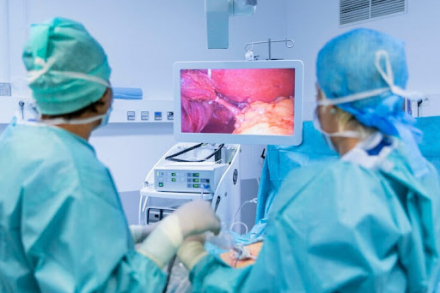

















What is ovarian cancer?
Ovarian cancer is a malignant tumor that develops in the ovaries, the organs that produce eggs and hormones in women. It is one of the most common cancers of the female reproductive system, often diagnosed at later stages due to nonspecific symptoms.
Causes and Risk Factors
Several factors can increase the risk of developing ovarian cancer:
- Age: The risk increases with age, especially after 50 years.
- Family history: Cases of ovarian cancer, breast cancer, or colorectal cancer in the family.
- Genetic mutations: The presence of mutations in the BRCA1 and BRCA2 genes.
- Reproductive factors: Lack of pregnancies or late onset of menopause.
- Hormone therapy: Prolonged use of estrogen therapy after menopause.
- Endometriosis: A condition in which the tissue lining the uterus grows outside of it.
Symptoms
In the early stages, ovarian cancer may be asymptomatic or have very nonspecific symptoms. Symptoms that may appear include:
- Feeling of abdominal bloating or increased abdominal size.
- Pain in the abdomen or pelvis.
- Feeling full quickly when eating or a sense of fullness.
- Problems with urination or frequent urge to urinate.
- Abnormal vaginal bleeding.
- Unexplained weight loss.
- Persistent fatigue.
- Back pain.
Diagnosis
Several methods are used to diagnose ovarian cancer:
- Ultrasound (US): Helps detect masses in the ovaries.
- Computed tomography (CT) or magnetic resonance imaging (MRI): Helps obtain detailed images of internal organs.
- Blood test for tumor markers: Specifically, CA-125 to detect elevated protein levels associated with ovarian cancer. The HE-4 tumor antigen test is also performed.
- Biopsy: Taking a tissue sample for examination under a microscope. Usually performed with diagnostic laparoscopy with biopsy.
Treatment
Treatment methods depend on the stage of cancer and the patient's overall health. The main methods include:
- Surgery: Removal of the tumor, often along with affected organs, such as the ovaries, uterus, and fallopian tubes. These are called cytoreductive surgeries.
- Chemotherapy: The use of drugs to destroy cancer cells, which can be used before or after surgery.
- Radiation therapy: Used less frequently, but may be effective in some cases.
- Targeted therapy: The use of drugs that act on specific molecules of cancer cells.
- Immunotherapy: The use of drugs that stimulate the immune system to fight cancer cells.
Prevention
Although there is no way to completely prevent ovarian cancer, the risk can be reduced by following these recommendations:
- Regular check-ups: Undergoing regular gynecological exams.
- Genetic testing: For women with a family history of cancer, discussing the possibility of genetic testing with a doctor can be helpful.
- Weight control: Maintaining a healthy body weight.
- Balanced diet: A diet rich in vegetables, fruits, and whole grains.
- Hormone therapy control: Discussing the risks and benefits of prolonged use of hormone therapy after menopause with a doctor.
Ovarian cancer is a serious disease, but thanks to modern diagnostic and treatment methods, the chances of recovery can be significantly increased. It is important to have regular preventive examinations and to see a doctor if any concerning symptoms appear. Take care of your health and take care of yourself!
We will discuss all questions regarding the surgery and the postoperative period during our meeting at the clinic.
You can view these and other surgeries on my YouTube channel.





